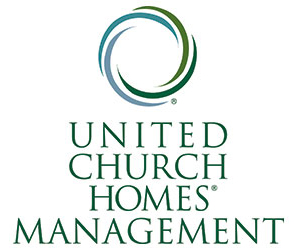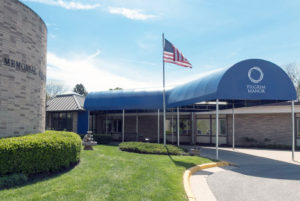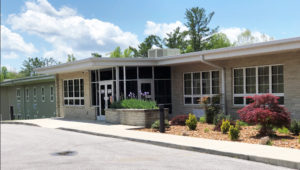CHHSM Member United Church Homes Helps Others Develop Servant Leaders and Long-Term Sustainability
 What happens when smaller single-site organizations come to UCC CHHSM members for help? Help arrives in a variety of ways. For United Church Homes, based in Marion, Ohio, those services arrive via its United Church Homes Management division.
What happens when smaller single-site organizations come to UCC CHHSM members for help? Help arrives in a variety of ways. For United Church Homes, based in Marion, Ohio, those services arrive via its United Church Homes Management division.
Created in 2001 following the purchase of a management group, UCHM is a wholly-owned, for-profit subsidiary of United Church Homes that provides governance, property management, programming, and organizational growth services and guidance to its partners and affiliates across the country.
UCHM grew out of a number of requests from single-site care communities who needed operational support, says the Rev. Kenneth V. Daniel, United Church Homes president and CEO.
“People started asking for help,” he says. Originally, “UCHM was perceived as a way to partner with small organizations.”

Pilgrim Manor
One such example is Pilgrim Manor in Grand Rapids Mich., who originally consulted with UCHM in 2012. “At a critical time for Pilgrim Manor … UCHM offered and provided support with no commitment pressure,” says Karen Messick, then-executive director of Pilgrim Manor. “Regardless of any future outcome, UCHM committed to Pilgrim Manor’s success even if it meant that no relationship would result in the end. That meant everything to the board and me … it wasn’t just about making a good business decision: this relationship developed out of a shared commitment to our mutual mission, vision and values.”
During a four-year process, Pilgrim Manor examined ways to partner with UCHM, ultimately deciding to fully integrate with United Church Homes in 2016.
Over time, United Church Homes Management has changed and evolved, expanding to more effectively minister to others. In 2016, following the success story at Pilgrim Manor, Messick became executive director of UCHM. “I am truly grateful for the relationship that Pilgrim Manor and United Church Homes now has,” she says, “and for the opportunity for me to bring others to a similar success in whatever way is determined best for all involved.”

Uplands Village
Another success story is the current partnership between UCHM and Uplands Village, an independent life care community located in the Cumberland Plateau city of Pleasant Hill, Tenn. Uplands is in the middle of three-year full-service management contract with UCHM.
Although Uplands is a unique, long-standing UCC community, it couldn’t — for example — access the best pricing for many of its services, Daniel says. “So the affiliation helps them with things like pharmacy and other operational pricing via UCHM while still remaining independent. Uplands is a perfect example of how UCHM fills a need.”
The partnership between Uplands and UCHM “has provided resources that have helped Uplands become more stable in policies and procedures that have allowed us to work more efficiently as a business,” says Herschel Murnur, executive director of Uplands. “The knowledge and expertise of the leadership staff at UCHM has allowed us to grow our own staff and provide them with the tools to become a more successful life planning community.”
Holly Hanson, Uplands board chair, concurs. “We would not be where we are today if we did not have the guidance and the resources of United Church Homes,” Hanson says.
UCHM also has helped Uplands create a newly-focused website, and supports its emphasis on the environment. In summer 2018, it underwrote the cost of an environmental design intern from Ohio State University to work with Uplands’ Green Team on its Love of Creation goals.
“We are excited to grow as an organization and to know that UCHM will be there with us every step of the way,” Murnur adds.
Particularly when the partner is part of the UCC family, the focus is on the larger picture, Daniel says. “It’s not a money-making endeavor.” The focus, he says, is on the relationships with those communities over time, and how the partnerships can better serve their resident populations and communities.
But UCHM sees its mission as more than just UCC-related. Currently, it has partnerships with several independent, nonprofit single-site communities as well as with nine Christian Church (Disciples of Christ)-related affordable housing communities.
One benefit of UCHM’s services is the possibility of involving all affiliates and partners in United Church Homes programming and activities. For example, affiliated sites are invited to participate in UCH’s in-house leadership development program.
“It’s missional to us, building long-term, mutually-beneficial relationships,” says Daniel. UCHM values the collegial aspect, he adds, bringing value by including and inviting staff and residents as full participants in those activities.
United Church Homes’ chaplains group, for example, is open to all affiliated organizations, too. The group provides opportunities for meetings and video conferencing, as chaplains share information and support each other.
Perhaps the most important part of UCHM’s services is the support it provides to boards of directors. That support is “probably the most undervalued yet highly utilized aspect of UCHM,” Daniel says.
UCHM helps boards articulate their mission, vision, and core values. It also provides support as boards align their roles in corporate compliance and ethics, and provides best practices guidance.
“The focus for boards is changing from day-to-day operations to impactful strategizing and repositioning their communities over time,” says Daniel.
But “the pace of change has quickened” so that boards often become bogged down in short-term strategies only. “In many cases, UCHM takes on some of that short-term process in order to help boards strategize, which helps them evolve more long-term, sustainable changes,” he says.
Daniel is quick to point out that United Church Homes is not the only CHHSM member offering such services. Like UCHM, others also have found servant leadership benefits via similar programs.
“We’re not unique in doing this,” he says, citing the UCC’s Phoebe Ministries in Pennsylvania. Years ago, Phoebe developed a pharmacy program for its communities that was so successful that the program is now utilized by many other organizations.
“Our CHHSM members innovate, and then look at how those innovations can be extended to others,” Daniel says.
The key to success in offering management services is to custom tailor programs and services to the individual organizations, Messick adds. UCHM supports and grows servant leaders by recognizing the specific needs of the organization, she says. “UCHM does not attempt to provide a one-size-fits-all solution, but rather does the due diligence to listen, ask questions, and gain understanding … to develop the right customized and comprehensive plan for ensuring the community’s sustainability.”
It’s all part of the changing focus of providing services, Daniel says. Across the country, “partnerships are becoming more and more important to the missional plans” of nonprofit care communities, he says. “UCHM helps facilitate those partnerships.”
Join Our Mailing LIst
Follow on Facebook
Iredell Adult Day Services Hosts Ribbon-Cutting to Celebrate Adult Day Health Certification - CHHSM
www.chhsm.org
Iredell Adult Day Services (IADS) in Newton, N.C. — a nonprofit organization dedicated to caring for older adults, vulnerable groups, and their families, and part of EveryAge — hosted a ribbon cut...